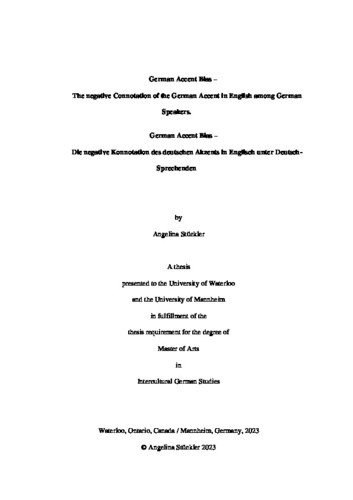| dc.contributor.author | Stuckler, Angelina | |
| dc.date.accessioned | 2024-01-26 16:06:47 (GMT) | |
| dc.date.available | 2024-01-26 16:06:47 (GMT) | |
| dc.date.issued | 2024-01-26 | |
| dc.date.submitted | 2023-09-15 | |
| dc.identifier.uri | http://hdl.handle.net/10012/20302 | |
| dc.description.abstract | In a globalized world, multilingualism is prevalent, with English as one of its major lingua franca. However, a German accent in English is often perceived as a lack of linguistic competence. An accent is seen as an indicator of otherness or incompetence and can result in major negative outcomes, such as discrimination, a smaller probability of economic success and social inequality or exclusion.
Current research shows an internalized hatred of German accents among Germans. The research is based on an extensive literature review and analysis of interviews with German expatriates. Data are analyzed qualitatively to examine linguistic bias toward German accents in English. The results indicate that German English L2 speakers evaluate the German accent negatively. This linguistic bias is manifested in critical comments about a perceptual accent. The theses of this research are firstly, who can recognize and negotiate negative assessment of German accentuated English. Secondly, which mechanisms are they using to evaluate the accent, both implicitly as well as explicitly in a negative way? And lastly, how did the connotation of the accent change over time and which reasons are stated for the avoidance and dislike of a German accent? The results illustrate how this bias becomes relevant in interactions and is revealed through self- and other positioning.
The results confirm a negative connotation of the German accent and show that these evaluations play a role in interactions. It becomes clear that the causes and effects of this connotation are subject to change over time and can lead to negative perceptions and linguistic biases. The results offer clues for dealing with the German accent in English, especially for German as a foreign language, to reduce or overcome the negative connotations. | en |
| dc.language.iso | de | en |
| dc.publisher | University of Waterloo | en |
| dc.subject | accent bias | en |
| dc.subject | membership categorization | en |
| dc.subject | language attitudes | en |
| dc.subject | positioning | en |
| dc.subject | german accent | en |
| dc.title | German Accent Bias – The negative Connotation of the German Accent in English among German Speakers. | en |
| dc.type | Master Thesis | en |
| dc.pending | false | |
| uws-etd.degree.department | Germanic and Slavic Studies | en |
| uws-etd.degree.discipline | German (German Studies, Intercultural) | en |
| uws-etd.degree.grantor | University of Waterloo | en |
| uws-etd.degree | Master of Arts | en |
| uws-etd.embargo.terms | 0 | en |
| uws.contributor.advisor | Liebscher, Grit Dr. | |
| uws.contributor.advisor | Oloff, Florence Dr. | |
| uws.contributor.affiliation1 | Faculty of Arts | en |
| uws.published.city | Waterloo | en |
| uws.published.country | Canada | en |
| uws.published.province | Ontario | en |
| uws.typeOfResource | Text | en |
| uws.peerReviewStatus | Unreviewed | en |
| uws.scholarLevel | Graduate | en |

